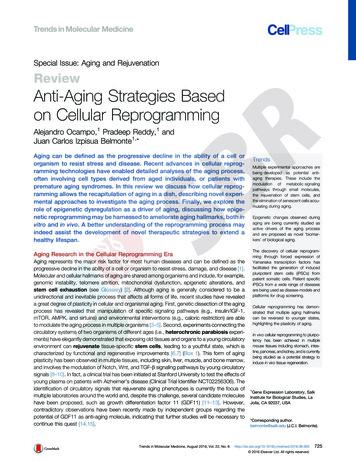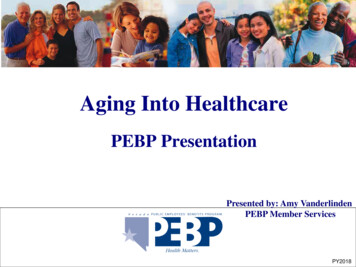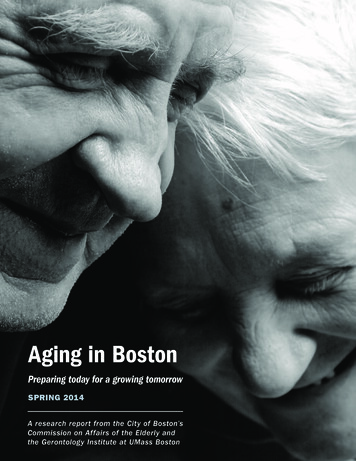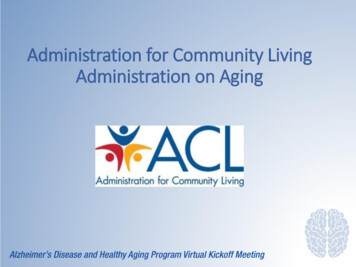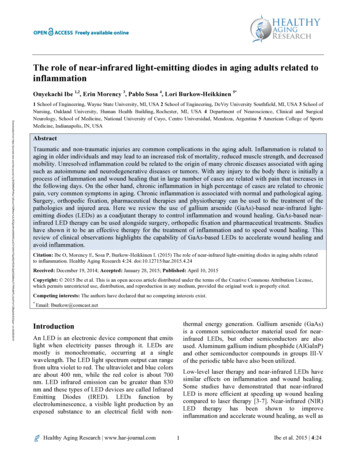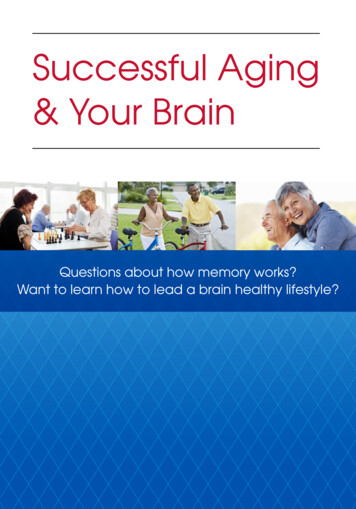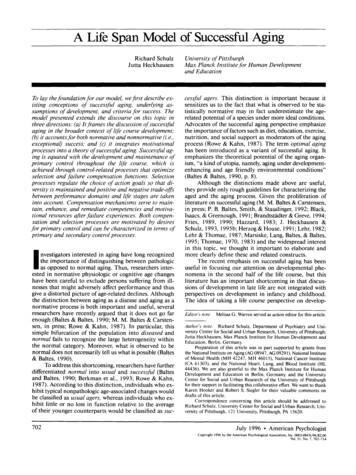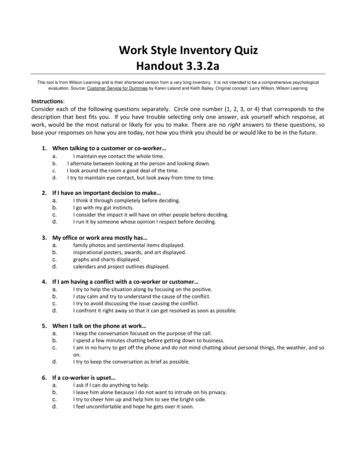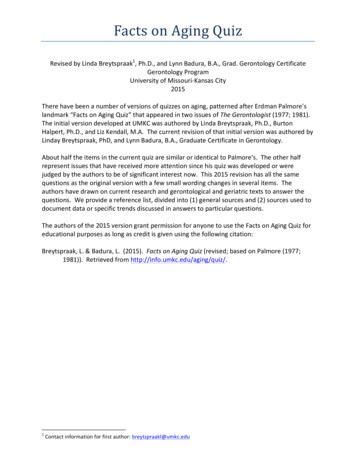
Transcription
FactsonAgingQuizRevisedbyLindaBreytspraak ateGerontologyProgramUniversityofMissouri- ytspraakl@umkc.edu
FactsonAgingQuizT F1. The majority of old people (past 65 years) have Alzheimer's disease.T F2. As people grow older, their intelligence declines significantly.T F3. It is very difficult for older adults to learn new things.T F4. Personality changes with age.T F5. Memory loss is a normal part of aging.T F6. As adults grow older, reaction time increases.T F7. Clinical depression occurs more frequently in older than younger people.T F8. Older adults are at risk for HIV/AIDS.T F9. Alcoholism and alcohol abuse are significantly greater problems in the adultpopulation over age 65 than that under age 65.T F 10. Older adults have more trouble sleeping than younger adults do.T F 11. Older adults have the highest suicide rate of any age group.T F 12. High blood pressure increases with age.T F 13. Older people perspire less, so they are more likely to suffer from hyperthermia.T F 14. All women develop osteoporosis as they age.T F 15. A person's height tends to decline in old age.T F 16. Physical strength declines in old age.T F 17. Most old people lose interest in and capacity for sexual relations.T F 18. Bladder capacity decreases with age, which leads to frequent urination.T F 19. Kidney function is not affected by age.T F 20. Increased problems with constipation represent a normal change as people get older.T F 21. All five senses tend to decline with age.T F 22. As people live longer, they face fewer acute conditions and more chronic healthconditions.T F 23. Retirement is often detrimental to health--i.e., people frequently seem to become ill ordie soon after retirement.T F 24. Older adults are less anxious about death than are younger and middle-aged o.umkc.edu/aging/quiz/2
T F 25. People 65 years of age and older currently make up about 20% of the U.S. population.T F 26. Most older people are living in nursing homes.T F 27. The modern family no longer takes care of its elderly.T F 28. The life expectancy of men at age 65 is about the same as that of women.T F 29. Remaining life expectancy of blacks at age 85 is about the same as whites.T F 30. Social Security benefits automatically increase with inflation.T F 31. Living below or near the poverty level is no longer a significant problem for mostolder Americans.T F 32. Most older drivers are quite capable of safely operating a motor vehicle.T F 33. Older workers cannot work as effectively as younger workers.T F 34. Most old people are set in their ways and unable to change.T F 35. The majority of old people are bored.T F 36. In general, most old people are pretty much alike.T F 37. Older adults (65 ) have higher rates of criminal victimization than adults under 65 do.T F 38. Older people tend to become more spiritual as they grow older.T F 39. Older adults (65 ) are more fearful of crime than are persons under 65.T F 40. Older people do not adapt as well as younger age groups when they relocate to a newenvironment.T F 41. Participation in volunteering through organizations (e.g., churches and clubs) tends todecline among older adults.T F 42. Older people are much happier if they are allowed to disengage from society.T F 43. Geriatrics is a specialty in American medicine.T F 44. All medical schools now require students to take courses in geriatrics andgerontology.T F 45. Abuse of older adults is not a significant problem in the U.S.T F 46. Grandparents today take less responsibility for rearing grandchildren than ever before.T F 47. Older persons take longer to recover from physical and psychological stress.T F 48. Most older adults consider their health to be good or excellent.T F 49. Older females exhibit better health care practices than older males.T F 50. Research has shown that old age truly begins at kc.edu/aging/quiz/3
AnswerstoFactsonAgingQuiz1. eimer’sdisease.Aboutone- jority(82%)areage75orolder.2. d- necanbemodifiedbylife- thydiet,mentalstimulation,andsocialinteraction.3. fficiencyovertheirlifespan.4. .http://info.umkc.edu/aging/quiz/4
5. ismodestmemoryloss,primarilyshort- disease,medicationeffects,depression,andage- aplacemayhelptopromptmemory.6. largeincreasesinresponsetimewithincreasingage.7. stoadiagnosisofclinicaldepressionbytheDSM- effects.8. ericansaged55andolderin2010.9. ore(1977;1981)).http://info.umkc.edu/aging/quiz/5
rdrinkinghabitshavenotchanged.10. outines;andpoorsleephygiene.11. dthatin2013thehighestsuicideratewasamongpersons45- 8.6)occurredinthose85yearsandolder.The65- ‐84agegrouphadroughlythesamerateas25- dyoungadultsaged15- deradults(65 majorityofsuicidesinallagegroups.12. ordertoreduceconcernsrelatedtoover- fo.umkc.edu/aging/quiz/6
s.13. rategiesforhyperthermia.14. XA(dual- ‐energyx- eakbonemineraldensityofahealthy30- aypresentrisksforcervicalcancer.15. /info.umkc.edu/aging/quiz/7
ecurvaturethatcontributestoheightloss.16. openia,theage- ndminimizefalls.17. precedingyear(comparing57- ‐64,65- ‐74,and75- h65- 1977;1981)).http://info.umkc.edu/aging/quiz/8
18. reasedchanceforchronickidneydisease.19. sociatedwithtubule- rrenturinarytractinfectionsanddrug- ion.20. .edu/aging/quiz/9
21. eolderperson'senvironment.22. itions.Thesearelong- vearesidualdisabilitythatmayrequirelong- thritisanddiabetesinthatorder.23. Retirementisoftendetrimentaltohealth- ‐- http://info.umkc.edu/aging/quiz/10
24. ndmiddle- thatolderadultsarelessfearfulofdeaththanmiddle- orethandeathitself.25. ration(born1946- epopulation.26. tivelysmallpercentageofthe65 %forpersons65- ‐74yearsto3%forpersons75- ‐84yearsand10%forpersons85 .27. dolderadults.Familiesprovide70to80percentofthein- eachesalong- redforit.28. 1977;1981)).http://info.umkc.edu/aging/quiz/11
29. andsocialpsychologicalsurvivaladvantages.30. increased1.7%in2015.31. portionofolderpeople(65 vertylevelasacut- livingalone.32. dentsforyoungdrivers,whileright- ‐of- vingolderdrivers- ‐- ‐whichimpliesabreakdowninsuchcognitive- p://info.umkc.edu/aging/quiz/12
33. ngeintheworkplace- ‐- ithco- ‐workers
Older adults have the highest suicide rate of any age group. T F 12. High blood pressure increases with age. T F 13. Older people perspire less, so they are more likely to suffer from hyperthermia. T F 14. All women develop osteoporosis as they age. T F 15. A person's height tends to decline

